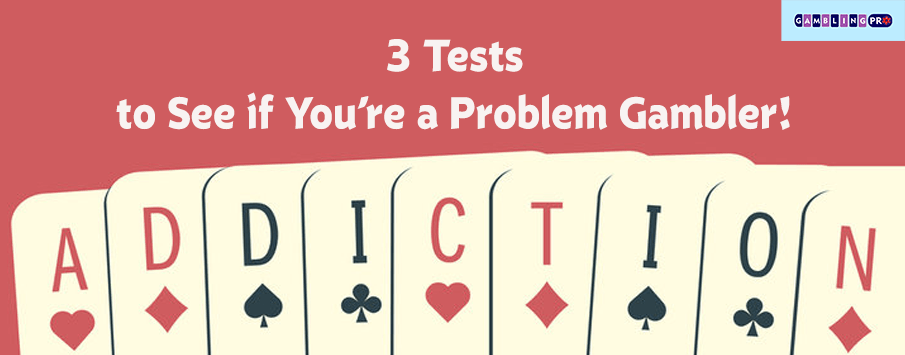
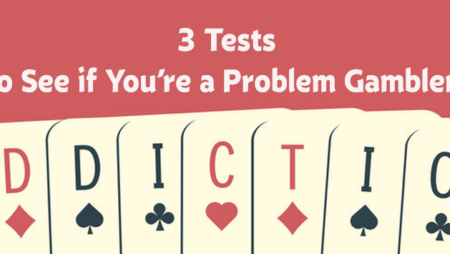 Three Tests to See if You're a Problem Gambler!
Three Tests to See if You're a Problem Gambler! Three tests? Although gambling is not as highly addictive as drugs and alcohol, it is no less dangerous! Perhaps the only difference between gambling addiction and other types of addiction is that gambling doesn’t have physiological symptoms, but rather affects one's social life, financial security, and course of his career. Certainly, these effects can be devastating in both the medium and long term.
As for the short term, you can imagine that a person addicted to gambling can reach the credit limit of their credit card in one gaming session!
List of top Non GamStop Casinos
⚠ Disclaimer
We disclose that we have an affiliate partnership with this casino. Our earnings are generated when visitors access the casino's website, create an account, and make deposits. It's important to emphasize that this affiliation does not influence the impartiality of our casino reviews or ratings.
Last updated: 7 June 2025
🚀 Fast Payments 👩🎤 Top Slots 🔒 Secure
Conventional casinos have put in place sophisticated systems that can detect gambling addiction patterns and completely exclude addicts from entering all casinos in the region/ country. It is not the same for online casinos as they do not have the necessary mechanisms to detect and exclude addicts. Furthermore, unfortunately, there are some casinos that take advantage of people who are addicted to gambling and get them to gamble with more money to exhaust their savings.
If you are still skeptical about the seriousness of gambling addiction, it suffices to say that a slot machine or announcing that someone has won a jackpot in a lotto is enough to turn an ordinary person into a gambling addict! This is not an exaggeration since gambling addiction stems from the person's own genetics and inclinations. These inclinations are able to express themselves in the narrowest of ways. This means that a person with a problem with a gambling addiction has to attract double efforts, as well as the people around him, to overcome this ordeal.
What Is Gambling Addiction?
Gambling addiction can happen to anyone in any area of life. There are countless forms of gambling and they are common and available in even the most closed countries and the most militant cultures. Easily, harmless gambling can turn into an unhealthy obsession with dire consequences. Gambling addiction can be caused by sports betting, slots, roulette, poker, baccarat, scratch cards, or even the lottery.
The consequences of a gambling addiction problem can strain your relationships, destroy your financial security, lose your job, or get into awkward situations with your creditors. Even a gambling addict can do things he never thought he would do like accumulate huge debts or even steal money to gamble.
Gambling addiction is also known as pathological gambling, compulsive gambling, or even gambling disorder. According to all specialists, gambling addiction is a “disorder in the control of impulses towards gambling.” For example, a healthy gambler knows what value to bet, and what budget to stick to. Most importantly, if a health-motivated person experiences losses, he knows when to stop and overcome the pain of loss without having thoughts such as the necessity of recovering losses. Conversely, if you are a compulsive gambler, you will not be able to control your impulses to gamble. Surely this bad thing will have bad consequences for you and your loved ones.
A person who is addicted to gambling bets whether they are frustrated, broke or a geek. He keeps gambling regardless of the consequences – even if he knows the odds are against him or the next loss he can't take.
Since realizing the problem is the first step to treating it, on this page we will provide you with three comprehensive tests that you can rely on if you feel that you have addictive tendencies towards gambling!
Separating Myths from Facts About Problem Gambling
Myth: You have to gamble every day to really be addicted to gambling.
Fact: A gambling addict can gamble too often or too little. Gambling is a problem if it causes problems.
Myth: Problem gambling is not a problem if the gambler can handle it.
Fact: The problems caused by excessive gambling are not only financial, but can also lead to relationship problems or psychological problems such as depression, anxiety or job loss.
Myth: Problem gambling is a state of weak will, irresponsibility or lack of intelligence.
Fact: Gambling problems affect people of all levels and backgrounds.
Myth: If a gambler has accumulated debts, you should help him.
Fact: A quick fix strategy is not the right thing to do in this situation. In other words, paying off the problem gambler's debt may make him keep gambling.
Signs & Symptoms of Gambling Addiction: Three tests
Psychologists refer to the signs and symptoms of gambling addiction as a “hidden disease” because it doesn’t have any obvious physical symptoms such as drugs or alcohol addiction. Even the lack of physiological symptoms leads some people to question the idea that gambling is an addiction. According to the rule: Experience is the best guide, the following three tests may help you find out if you have a gambling addiction.
The First Test – Checking the Problem of Gambling Addiction
Do you bet more than you can afford to lose?
- Yes
- No
Do you gamble bigger bets to get the same excitement?
- Yes
- No
Do you feel you are having trouble gambling?
- Yes
- No
Do people criticize your gambling behavior or tell you that you have a gambling problem?
- Yes
- No
The Second Test – the Effect of the Problem Gambling on Your Friends & Family
Has gambling caused any financial problems for your family?
- Yes
- No
Has your spending on your children been affected by gambling?
- Yes
- No
Do you feel guilty about the way you gamble or what happens when you gamble?
- Yes
- No
Has gambling caused you any health problems, including stress or anxiety?
- Yes
- No
The Third Test – the Impact of Gambling on Your Career
Do you gamble as a way to escape the stress of work?
- Yes
- No
Do you gamble during work hours or during breaks from work?
- Yes
- No
Are you late for work because you stay up late for gambling?
- Yes
- No
Tests Results
If you answered yes to five or more of the above questions, you may need to get professional support quickly. Fortunately, you can contact charities that provide free and professional support for gamblers such as Gambler Anonymous or GamCare.
Conclusion
In no way should the problem of gambling addiction be underestimated. If you or anyone else has or is at risk of developing this problem, it is important that you take quick steps to deal with it. One of the easiest and most effective ways to deal with this problem is to sign up for self-exclusion programmes such as GamStop and GamBan. You can also get professional support from a charity that helps problem gamblers such as Gambler Anonymous and GamCare.





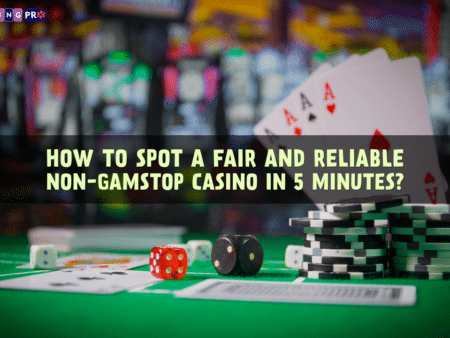








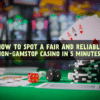

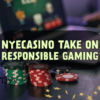

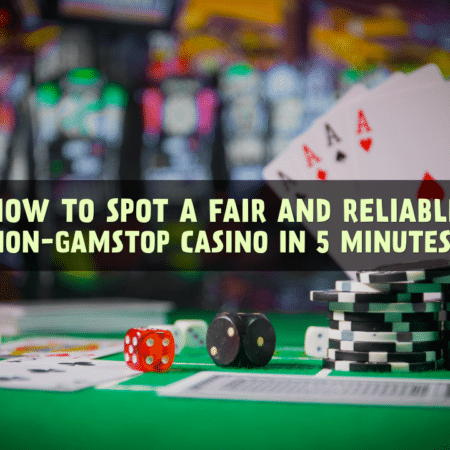

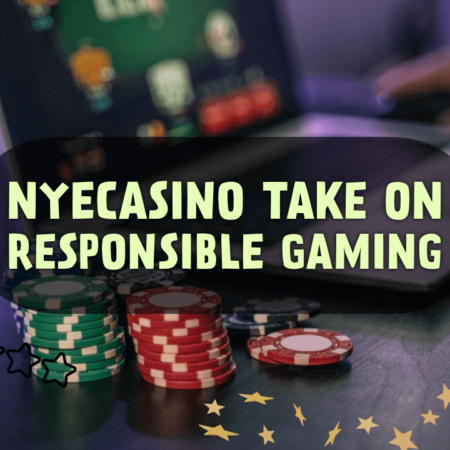












[…] If the casino has the seal of one of the committees, then the games it hosts are secure and reliable. One of the most popular testing agencies out there at the moment is eCOGRA which is an independent testing agency and standards organization that focuses on fair gaming and protecting players from problem gambling. […]
[…] that provides information to the general public and the professional community about compulsive problem gambling and its effects on families and friends. It is a 12-step self-help fellowship for men and women who […]
[…] like Minds. This charter's mission is to provide advice and support to anyone struggling with a gambling problem. Minds aims not only to treat people with gambling addiction but also to raise awareness of the […]
[…] is unique about this service is that it will support you through solving the problem, starting with identifying the reason for the accumulation of debts on you and preventing it in […]
[…] works on just about everything to give people the knowledge and confidence they need to solve the problem they have and prevent it in the […]
[…] gambling is a great recreational activity for some players, it can become a serious problem for a large segment of other players. According to the latest Public Health England report on […]
[…] an effort to support responsible spending and help those with gambling problems, Barclays introduced a gambling block feature, a financial tool aimed at curbing the potential for […]
[…] Maintain awareness of your gambling habits to prevent a relapse into problematic behavior. […]
[…] especially those related to gambling. This feature is particularly useful for those who have recognized problematic gambling behaviors and wish to implement a form of external […]
[…] problem for those with gambling addictions. It's not only a financial drain but can also lead to problematic behavior and mental health issues. For young users, exposure to gambling sites can lead to an early and […]
[…] conduct a self-assessment of your gambling habits and identify any triggers that may lead to excessive or problematic behavior. Reflect on your motivations for gambling and ensure that it remains an enjoyable and controlled […]
[…] conduct a self-assessment of your gambling habits and identify any triggers that may lead to excessive or problematic behavior. Reflect on your motivations for gambling and ensure that it remains an enjoyable and controlled […]
[…] Finally, your account will be reactivated. However, Sky Bet will continue to monitor your activities to offer support and prevent potential relapses into problematic gambling behaviors. […]